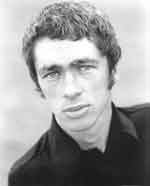Archive Interview • MAT FRASER • On Blindness • 2004

Mat Fraser
Photographer – Patrick Barth
Mat Fraser is an old hand at treading the boards. He may have been “an impoverished musician” for fifteen years and only realize in the early 1990s — courtesy of a Graeae production — that acting was a viable option for someone like him, but he was a babe in arms when he first appeared on stage. “Classically, I was on tour at the age of six months with my mum and dad because they were playing opposite each other in Salad Days,” he tells me. “And then it toured. So yes, I did a lot of touring before I was one.” We are talking over the telephone in a break from rehearsals of Glyn Cannon’s first full-length play, On Blindness, now running at the Soho Theatre in London.
My use of phrases such as ‘an old hand’ and ‘babe in arms’ has been entirely unconscious but could so easily be construed as derogatory in this hyper-politically correct world. Mat Fraser, if you don’t already know, is what is commonly known as disabled. He was born with short arms — in other words, he was a Thalidomide baby; indeed, he’s writing a new one-man show, Thalidomide! A Musical.
Is he a disabled actor or an actor who just happens to be disabled? Is he a person or (just) a disabled person? Doubtless, the jury will always be out, though there are vociferous factions in the disability arena that would insist he is a disabled actor and a disabled person. I consider him an actor who, interestingly, happens to have physical differences to the next person. There is no question that the one informs the other but those differences are only a part of what makes up Mat Fraser.
As an actor myself, and one who has become disabled as the years have passed, I know a little of what I speak. Possessing a almost invisible — or possible-to-disguise disability — I spent years in denial of my condition, putting up with pain, loath to reveal to any potential employer that I was anything other than ‘normal’. I realised this was becoming detrimental to my health during an open-air production of Charley’s Aunt, but that’s another story.
Mat was in denial — ‘in denial of (the social construct that, for me, is) disability’, he writes on his website — until he saw Graeae’s production of Ubu, almost exactly ten years ago. What had happened previously? Had he thought well, an actor is what I want to be but it’s just going to be impossible because of all the problems? “Totally,” he says. “I didn’t even think twice as a youngster, I just wanted to do what my mum and dad did because they were both actors. My dad died in the mid-80s, my mum, Paddy Glynn, is still acting. And then I came to the school auditions for the school play when I was 13, and the girl that I fancied was sniggering and it suddenly occurred that I was embarrassing people. There was something in me, even though I couldn’t articulate it to myself, that knew that being embarrassing is not good for a performer and so I sort of went off in an opposite direction for 15 years, playing drums in punk bands and what-have-you.” He earned a living of sorts. “Well, yeah, I mean, you know! I was an impoverished musician but yeah. I mean, the band I was in was signed to a record label and everything. We did tours and all of that.”
Attending a performance of Graeae’s Ubu was a revelation. “I saw a load of disabled people on stage doing bawdy codpiece rudery and, lo and behold, the non-disabled audience guffawing and loving it, and I thought oh God, I was wrong, it is possible, and sort of made it my mission to join the company over the next year; I bullied my way in basically. I did four months in Forum theatre where I learnt a lot about political theatre, and then auditioned for Joe Orton’s What the Butler Saw that Graeae were doing and got the part of Dr Prentice. And then, from that, a friend of mine who was working for an agent as an assistant berated her for not having a disabled client and Hetty Churchill came to see the play and said yeah, alright, I’ll take Mat on. So out of that first production, I got an Equity card from Graeae and an agent. It was amazing.” Hetty Churchill’s belief, says Mat, is that “each agent should have a couple of disabled clients – there shouldn’t be a ‘disability agent’ because that would be kind of ghettoey. But it seems to work well with us. And I think I get her a reasonable amount of commission, as it were! She also now represents Kim Tserkezie, a wheelchair-using actress.”
Watching Mat present Born Freak on Channel 4 a year or so ago, a history of disabled performers and the freak shows by which they made a living, he seemed refreshingly down-to-earth and stoical — but he is an actor, so just how stoical is he? “I felt stoical when I was in the face of, not the enemy, but the idiots that were all coming to the freak show in Coney Island but in terms of life I don’t feel stoical about my arms because I don’t have any pain. I live in a constant world. I don’t have a degenerative condition of any sort. What I’ve got is what I’m always going to have and it’s what I’ve always had.” We touch on the differences between that ‘constant world’ and degenerative conditions, for in some ways I envy him and others like him. “Right. Sure. And it’s a whole other thing to deal with — something getting worse and being in constant pain is a whole other thing, I know it is.”
Minorities within the profession are often tarred with the brush of inexperience. “You know, one of the things I find is a huge difference between young disabled actors coming up and older actors who’ve become disabled,” says Mat. “They often stop acting once they’ve become disabled and I think that’s an awful shame. I understand why — they often come from a generation that would think well, if I’m disabled, that’s my career washed up. But au contraire, in fact, it’s never been a better time to be a disabled actor in terms of opportunities opening up. If one of the angles that’s thrown at us is that some of us aren’t very good, which may be the case because not a lot of us have had any training, what we need above all else is seasoned actors with that 35 years’ experience to not be ashamed to come and do a bit of inclusive or even disability theatre. I think each would feed the other.”
I ask him how valuable he considers the new Equity Disabled Register published by Spotlight. “I think it’s useful for casting directors who, increasingly now, find themselves having to use, or feeling that they should use a disabled actor when a disabled character needs casting. Now they can just go straight to that section in Spotlight or on the Equity register and go okay, I need a black guy, 25, wheelchair user, good-looking. Right, how many of those have we got? And immediately they can hit the button and find and come up with and know who to audition. Previously, it would have been very difficult for casting directors.” Obstacles remain, however. “It’s one of the annoying things because they’re worried that the director will be cross at them for showing ‘unnecessary’ promotion of disabled actors, who are also then worried about the producer thinking how it will affect the audience, you know, and so on and so forth. And that’s often been the problem, I think, in getting disabled actors to be cast in disabled character roles. It makes me fume but you have to understand the process and that clearly is one of the barriers.”
A couple of weeks previously, I had been up for a wheelchair part in the BBC’s Doctors, though I was not aware whether they had specifically asked for wheelchair users. “Doctors are quite good at casting disabled actors. I think the same casting people do Holby City, Doctors, and one other medical drama for the Beeb, don’t they. And they’re actually quite good. I mean, I got a part in Doctors, quite astoundingly. But the casting lot there have really bucked their ideas up a lot in terms of offering jobs to disabled actors or at least auditioning them.”
I ask him if there is one thing that really bugs him about being disabled, whether in life or as an actor? “I’d say not in life — I couldn’t pinpoint one thing except society’s inability to treat us as equals. But more so in work: what annoys me most is when a non-disabled actor has got a great part because there aren’t that many good disabled parts around. A lot of them are actually written really badly—”
“Because they’re written by somebody who doesn’t know what it’s like,” I say.
“Exactly, exactly. Shall we say, for example, the wheelchair user in The Book Club on Channel 4. I know personally five good-looking men who could have done that role who are wheelchair-using actors, and it really bugs me that in this day and age, 2004, this is happening. It’s the one thing that annoys me the most.” I tell him how angry I was to discover that the actor in question was not disabled. “I know,” says Mat. “We all were. It’s a joke, it’s almost adding insult to injury because he’s actually the man who’s climbed Ben Nevis. He’s quite famous in Scotland: he’s the Scott’s Porage Oats man. So it was particularly annoying. I mean, you know, God, you look back at film thirty years ago, what was its attitude…of course, they were never going to use a disabled actor but come on, things should have changed by now. The fact that they haven’t, really gets my goat.”
Any human being who is different to the ‘norm’ encounters difficulties undreamt of by others. One of them is being constantly met with an array of questions that have no right being asked. The most frequent faced by Mat is how he manages to masturbate. “There is something weird about people and disabled people. They feel that you’re public property, they can come up and ask the most personal questions, which they’d never ask a non-disabled person, and because obviously people think short arms, how does he reach it? And, as you’ll see on my site, I have various different responses to people who ask the question and whether I feel they’re genuine or not. I mean, if a bloke with no arms came up to me and said how do you wank, I’d tell him, straight. And if it’s a bunch of builders, then I tell them to fuck off!” A healthy response.
Healthy is also the word to use in describing the unique collaboration between Graeae, Paines Plough and Frantic Assembly that has resulted in the production of On Blindness, a first play by Glyn Cannon that incorporates six performers (Mat is joined by Scott Graham, Steven Hoggett, Karina Jones, Jo McInnes, and David Sands) and four directors (Vicky Featherstone, Jenny Sealey, Scott Graham and Steven Hoggett) with and without varying forms of impairment. “As an actor, if you get a job and they say there’s going to be four directors, obviously the old alarm bells ring because it could be four different sets of opinions. But actually, everyone’s playing to their strengths and we’re actually getting the best from each company which is great,” says Mat.
The pre-show publicity would seem to suggest that accessible arts is the play’s subject. In fact, accessibility as such is not discussed. “But the production will very much show what I hope will be exemplary accessible theatre,” says Mat. “There’s a blind character played by a visually impaired actress, Karina Jones, and so it’s touched on but nobody goes into one about disability on any level. And certainly I’m not playing disabled; even though my character’s informed by my short arms, nobody pays reference to them.” Hurrah for that.
On Blindness was developed as entirely accessible so that no matter what senses you possess or lack, or whatever your physical disabilities, you will be entertained. The use of British Sign Language, text projections and spoken descriptions are not peripheral to the action but totally integrated as part of the show, adding considerably to its success. Moreover, the Soho Theatre itself, as Mat makes a point of reminding me, is a fully accessible theatre.
On Blindness should clearly not be missed, whatever your personal perspective.
Sarah Vernon © 2004
Adapted from the original published on R&V on 22-02-04







Pingback: Archive Interview • MAT FRASER • On Blindness • 2004 | Rogues & Vagabonds